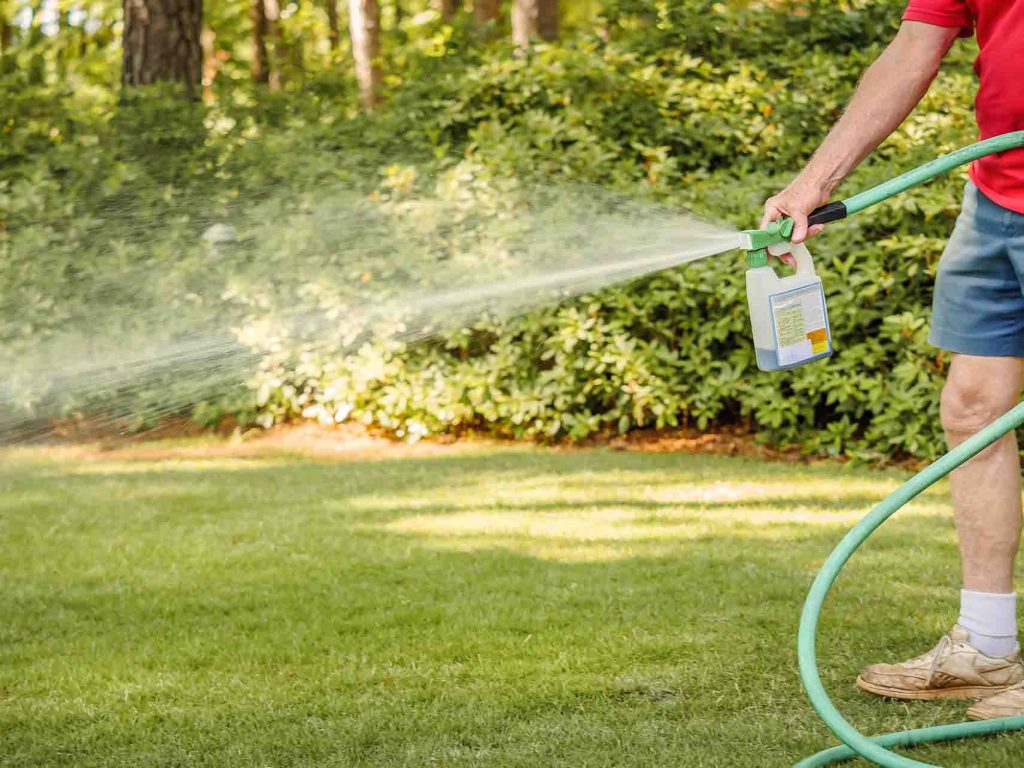The goal of achieving a perfect lawn starts with healthy soil. Soil rich in nutrients gives your lawn the strength it needs to withstand drought, weeds, and other pests. Beneficial insects and bacteria are abundant in healthy soil, allowing grass and plants to thrive.
Benefits Of Lawn Fertilizers

Experts agree that fertilizing your lawn is the key to that perfect lush green lawn of your dreams. When a lawn is properly fertilized, it benefits the grass, plants, and even the animals living in the area. Below are a few ways that fertilizers can benefit the health of the soil in your lawn.
- Increases nutrient availability: Fertilizers provide essential nutrients that plants need to grow and thrive. These nutrients include nitrogen, phosphorus, potassium, and other micronutrients. Plants can better resist pests and diseases when they can access the nutrients they need.
- Improves water-holding capacity: Fertilizing helps the soil hold more water, which can help reduce runoff and erosion.
- Increases organic matter content: Organic matter is important for soil health because it helps improve the soil’s structure, retain water, and provide nutrients to plants.
- Promotes microbial activity: Fertilizers can help to promote microbial activity in the soil. Microbes are essential for soil health because they help to break down organic matter, cycle nutrients, and control pests and diseases.
- Create drought-resistant soil: Fertilizing your lawn makes it less susceptible to the effects of droughts in your area. Properly fertilized soil can maintain its health even with less water.
It is important to note that the benefits of fertilizer on soil health depend on the type of fertilizer used, the amount of fertilizer applied, and the soil type. In some cases, excessive use of fertilizer can actually harm soil health.
Tips On Lawn Fertilization

It is important to use fertilizer wisely and to follow the recommendations of a soil scientist or other qualified professional, like those at Tuxedo Yard Care. Here are some additional tips for using fertilizer to improve soil health:
- Test your soil before you fertilize: This will help you determine the specific nutrients your soil needs.
- Use the right type of fertilizer for your soil type: Some fertilizers are better suited for certain soil types than others.
- Apply fertilizer at the right time of year: The best time to fertilize depends on the type of fertilizer and the type of plant.
- Water deeply after you fertilize: This will help the fertilizer reach the plants’ roots.
- Avoid over-fertilizing: Too much fertilizer can actually harm soil health.
Dangers Of Using Too Much Fertilizer

When fertilizing your lawn regularly, watch out for the signs of over-fertilized soil.
- Yellowing or browning of the tips of the grass blades: This is the most common sign of over-fertilization. The tips of the grass blades will turn yellow or brown because they cannot absorb all of the fertilizer.
- Scorching of the grass blades: In severe cases of over-fertilization, the entire grass blade may turn brown or black. This is caused by the high concentration of fertilizer burning the grass.
- Crusty residue on the soil: If you see a crusty residue on the soil after you fertilize, it is a sign that you may have applied too much fertilizer. This residue can prevent water from reaching the roots of the grass, which can lead to browning or death of the grass.
- Limp or black roots: If you dig up a few blades of grass and examine the roots, you may see that they are limp or black. This is a sign that the fertilizer has damaged the roots.
- Slow or no growth: If you have over-fertilized your lawn, you may notice that the grass is not growing as quickly as it should. This is because the fertilizer burns the roots and prevents them from absorbing water and nutrients.
- Weeds: Over-fertilization can make your lawn more susceptible to weeds. This is because the fertilizer gives the weeds the nutrients they need to grow.
If you notice any of these signs, it is important to take steps to correct the problem. The first step is to stop fertilizing your lawn. You should also water your lawn deeply to help flush out the excess fertilizer. If the damage is severe, you may need to reseed your lawn. A lawn care professional can best guide you through healing your lawn and restoring your soil health. The experts at Tuxedo Yard Care can help get your soil to its optimal health and give you the lush green lawn of your dreams.



